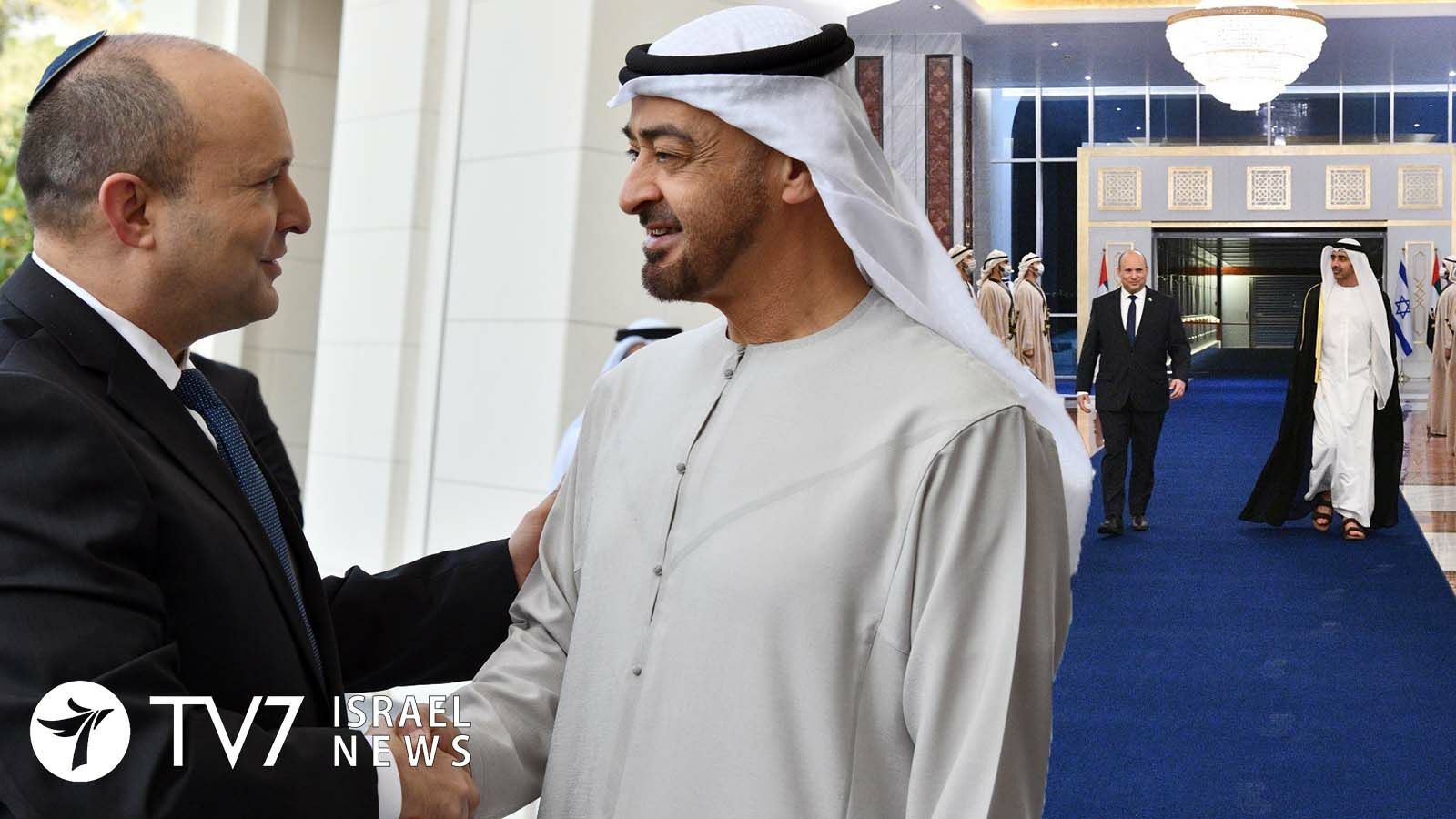On the first official visit by an Israeli leader to the United Arab Emirates, Prime Minister Naftali Bennett held talks with Crown Prince Sheikh Mohammed bin Zayed al-Nahyan at the latter’s private palace in Abu Dhabi today.
By Erin Viner
Since August 2020, the UAE – followed by Bahrain, Sudan and Morocco – have normalized ties with Israel under a US-sponsored initiative known as the Abraham Accords, named for the biblical patriarch revered by Jews, Christians and Muslims. Bennett’s visit, made at the invitation from Crown Prince Sheikh Mohammed bin Zayed, marks the first such trip by an Israeli premier to any of the states of Israel’s new allies.
Previous plans by the Premier’s predecessor Benjamin Netanyahu were shelved, with Israel citing COVID-19 travel curbs and difficulties in arranging a flight over Jordan.
Prior to boarding his flight from Tel Aviv, Prime Minister Bennett said he and the Sheikh Mohammed would be “discussing ways to further our cooperation in a number of fields, especially strengthening our economic and commercial ties.”
“In just one year since normalizing our relationship, we’ve already seen the extraordinary potential of the Israel-UAE partnership,” said the Premier, underscoring, “This is just the beginning.”
A flight-tracking app showed Bennett’s El Al Israel Airlines flight path over Saudi Arabia, which agreed last year to allow Israel-UAE flights to cross its territory despite the absence of official ties between the Jewish State and the Kingdom.
Upon arrival, Bennett was welcomed by an honor guard and UAE Foreign Minister Sheikh Abdullah bin Zayed Al Nahyani, in what he described as “a wonderful reception.”
The two new allies have already signed dozens of memorandums of understanding (MOUs) and Free Trade Agreements (FTAs) in the economic, health, travel and energy sectors. Bennett’s government is expected to decide this week whether to allow a private contract to go ahead, involving the offloading Gulf oil at the Red Sea resort of Eilat, which has been opposed by Israeli Energy Minister Karine Elharrar and faced challenges by environmentalists to the Supreme Court.
The diplomatic outreach to strengthen Gulf ties comes amid heightened regional tension as world powers try to revive the 2015 Joint Comprehensive Plan of Action (JCPOA) with Iran. The nuclear deal was opposed by Israel and abandoned in 2018 by then-US President Donald Trump, in a move that was welcomed by the UAE.
Israel has publicly mulled the establishment of joint defenses with Gulf Arab states that share concern over Iranian activities.
Senior Israeli officials confirmed that Prime Minister Bennett presented his host classified information recently obtained by Israeli intelligence regarding the deployment of Iranian-proxy militias and unmanned aerial vehicles (UAVs) in several locations in the volatile region.
Israel has publicly mulled the establishment of joint defenses with Gulf Arab states that share concern over Iranian activities.
Senior Israeli officials confirmed that Prime Minister Bennett presented his host classified information recently obtained by Israeli intelligence regarding the deployment of Iranian-proxy militias and unmanned aerial vehicles (UAVs) in several locations in the volatile region.
The sources noted that Bennett’s disclosure of the sensitive information comes in the wake of a rare visit to Tehran last week by UAE National Security Advisor Sheikh Tahnoon bin Zayed al-Nahyan, who is also the Crown Prince’ brother, to explore the possible expansion of bilateral ties during talks with Iranian President Ebrahim Raisi as well as his Iranian counterpart Ali Shamkhani.
Despite this evident point of concern for Israel’s security establishment, a senior Israeli official told TV7 that “Israel remains cleareyed about the Emirati reasoning behind its overt dialogue with the Ayatollah regime;” mentioning a Tweet by a senior diplomatic advisor to the UAE leader highlighting that his visit “comes as a continuation of the UAE’s efforts aimed at strengthening bridges of communication and cooperation in the region and in a manner that serves the national interest” as part of Abu Dhabi’s effort “to enhance regional stability and prosperity by developing positive relations through dialogue, building on common ground and managing divergent visions.”
Even though the UAE has long been one of the Islamic Republic’s main links to the outside world, the two sides have differed over geo-political rivalries in the Middle East, such as the war in Yemen; with the UAE participating in the Saudi-led coalition backing Yemen’s internationally recognized government against Houthi insurgents who are allied with Iran.
Sheikh Tahnoon expressed hope that the visit would be a “turning point” in bilateral ties, reported Iran’s state news agency IRNA reported.
“Improving ties with the regional countries is my government’s priority,” Iranian state television cited Raisi as telling the UAE National Security Advisor, adding that, “The security of the regional countries is intertwined, and Iran supports the security of the Persian Gulf states.”
“Stability and security can only be established through continuous dialogue and cooperation between the regional countries,” Shamkhani said, according to state TV, adding that joint efforts were needed to “end some of the military and security crises in the region…Dialogue should replace military approaches to resolve disputes.”
Iran’s Gulf Arab neighbors want an end to Tehran’s push for dominance in the region, where it competes with main rival Saudi Arabia for influence from Syria and Iraq to Yemen and Bahrain.
The region’s main Sunni Muslim power Saudi Arabia began direct talks with Shi’ite Muslim Iran in April, with Riyadh describing the talks as “cordial” but largely exploratory.
“Developing warm and brotherly relations between Abu Dhabi and Tehran is one of the UAE’s priorities,” Sheikh Tahnoon said during his meeting with Shamkhani, according to Iranian media.
